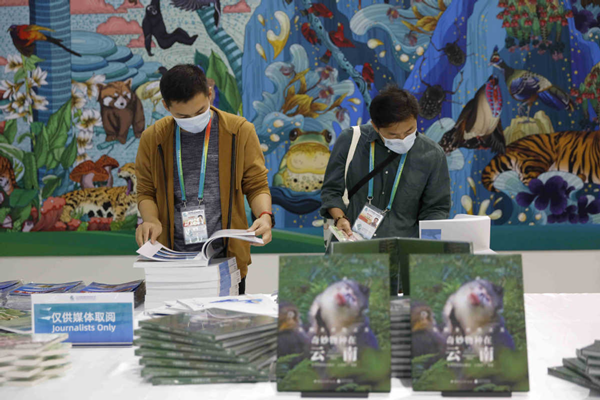
Journalists read brochures at the media center for the 15th meeting of the Conference of the Parties to the UN Convention on Biological Diversity, or COP 15, in Kunming, Yunnan province, on Saturday. The phase-one meeting of COP 15 starts on Monday and runs through Friday. LI JIAXIAN/CHINA NEWS SERVICE
President Xi Jinping will on Tuesday attend via video link the leaders' summit of the 15th meeting of the Conference of the Parties to the United Nations Convention on Biological Diversity (COP15) and deliver a keynote speech, Foreign Ministry Spokesperson Hua Chunying announced on Monday.
Environmental improvement in China under the ecological civilization promoted by President Xi Jinping is proof the philosophy can be an effective way forward for the world's sustainable development, experts said.
The philosophy stresses harmonious coexistence of man and nature and is a workable alternative to capitalism, they said. The remarks came ahead of the 15th meeting of the Conference of the Parties to the United Nations Convention on Biological Diversity, or COP 15, which will be held in Kunming, Yunnan province, from Monday to Friday and continue in the first half of next year under the theme of "Ecological Civilization-Building a Shared Future for All Life on Earth".
Qian Yong, director of the Research Center for Xi Jinping Thought on Ecological Civilization, said it's the first global UN conference with ecological civilization as a theme. This alone demonstrated the international significance of the Thought.
Inaugurated in July at the Ministry of Ecology and Environment office in Beijing, the center is tasked with researching not only theories relating to the philosophy, but also its practice.
Since the dawn of industrial civilization, mankind has created massive material wealth. However, it has come at a cost of exploitation of natural resources, resulting in increasing conflicts between man and nature, Qian said.
"In light of the serious challenges presented by industrialization such as environmental pollution and ecosystem degradation, the Chinese government has been advocating and working to advance ecological civilization," he said.
The development of China's ecological civilization has gained momentum since Xi became general secretary of the CPC Central Committee in 2012. "Both ecological civilization construction and the institutional system for environmental protection have been advanced in the country in an accelerated manner since then," Qian said.
Qian pointed to a number of key statistics to show the achievements China has made in environmental management.
As of the end of 2020, carbon dioxide emissions per unit of GDP in China had been reduced by 48.4 percent from the 2005 level, bettering the target of 40 to 45 percent.
China has seen its forest areas expand for 30 straight years, contributing to one-fourth of the growth in the world's afforested area. On average, desert land in the country decreases by 2,424 square kilometers every year.
Xi Jinping Thought on Ecological Civilization was officially established in 2018 at the national ecological and environmental protection conference. The harmonious coexistence of man and nature and the idea that "lucid waters and lush mountains are invaluable assets "are two of the eight core principles of the Thought.
"Xi Jinping Thought on Ecological Civilization does not only belong to China but also to the world," he said.
The philosophy is rooted in Chinese civilization and carries forward traditional Chinese ecological culture and wisdom. The philosophy not only addresses China's development problems, but also global problems that have arisen since the industrial civilization.
Australian philosopher Arran Gare said in a recent interview with China Daily that ecological civilization "is a science that is aligned with the humanities and facilitates an integration of the best thinking in the West with the best thinking in the East, including Confucianism and Daoism".
Modern life is characterized by economic globalization dominated by markets, said Gare, author of The Philosophical Foundations of Ecological Civilization: A Manifesto for the Future. The dynamics of these markets have set humanity on a trajectory of self-destruction through ecological destruction, he said.
The joining of ecology and civilization in ecological civilization provides a basis for redefining eco-socialism and eco-Marxism that should appeal to everyone around the world as an alternative to capitalism, he said.
Ecologists have shown that cooperation, rather than competition, is the most important factor in evolutionary progress. Capitalist competition and the conflicts it generates, including imperialist wars, are incompatible with ecological sustainability.
"Ecological civilization, founding civilization on ecological thinking, provides an image of the future to strive for," he said, adding it emphasized community and all humanity.
Ecological civilization is also an advanced form of science that recognizes the complexity and reality of life, as opposed to the reductionist forms of earlier science that attempted to explain away life as nothing more than chemical processes.
Gare said he looks forward to seeing China playing an even bigger role in promoting ecological civilization.
"China can promote the notion of ecological civilization in international institutions, as it has already done to some extent, having had it accepted by the United Nations," he said. "However, initial work in this area can be extended. It can also be extended through the Belt and Road Initiative."
Making the BRI conform to the goal of creating an ecological civilization was witnessed in the Chinese government's decision to cease support for the development of coal-fired power plants in other countries, he said. It could be taken further through establishing sustainable forms of agriculture in developing nations, and also developing alternative energy sources in these countries.
Building on the Chinese traditions of cultivation and celebration of nature, which are central to Confucianism and Daoism, China could develop a vibrant culture that provides an alternative to a consumer culture, he said.